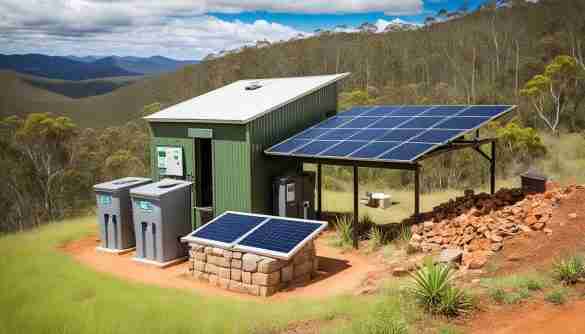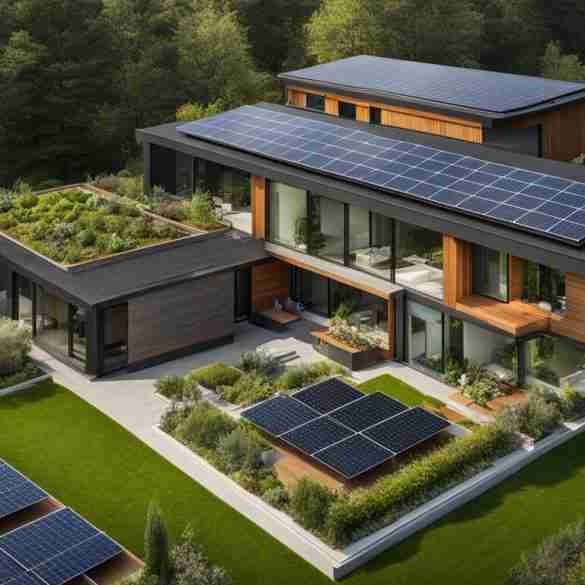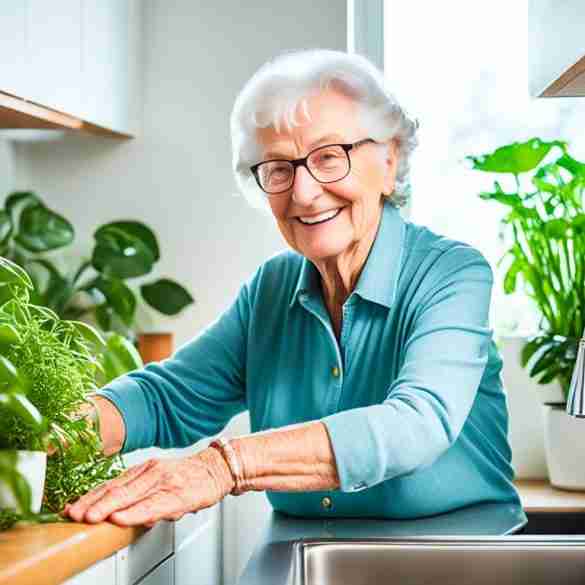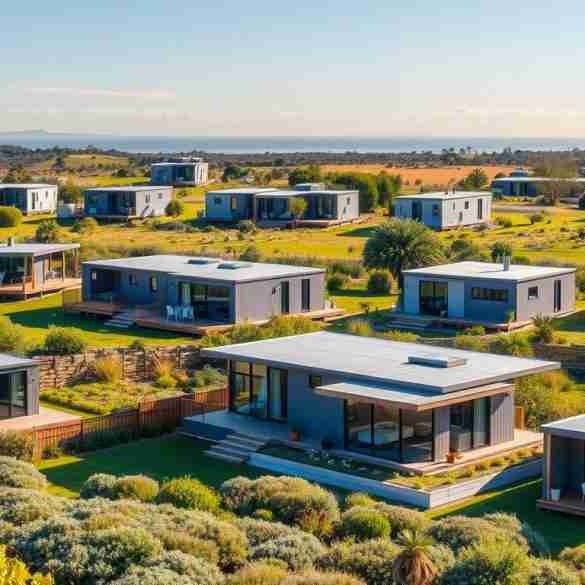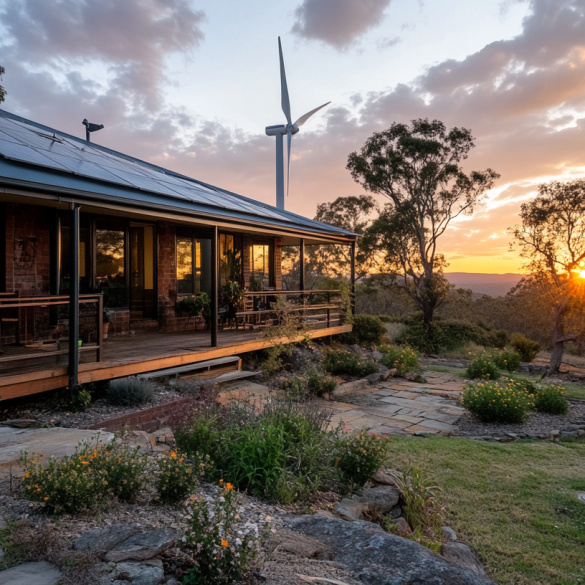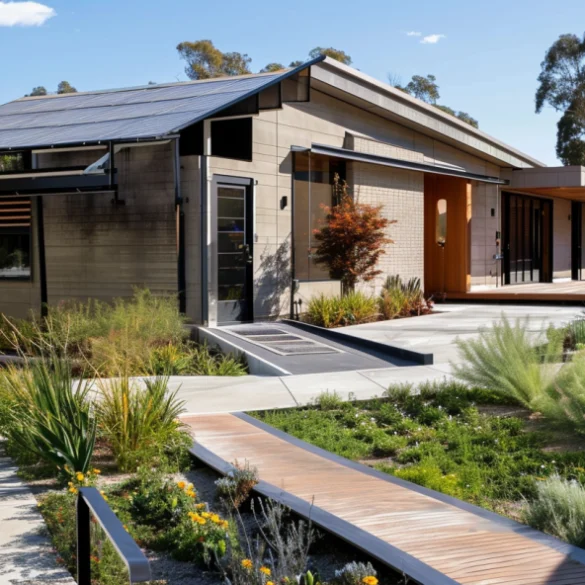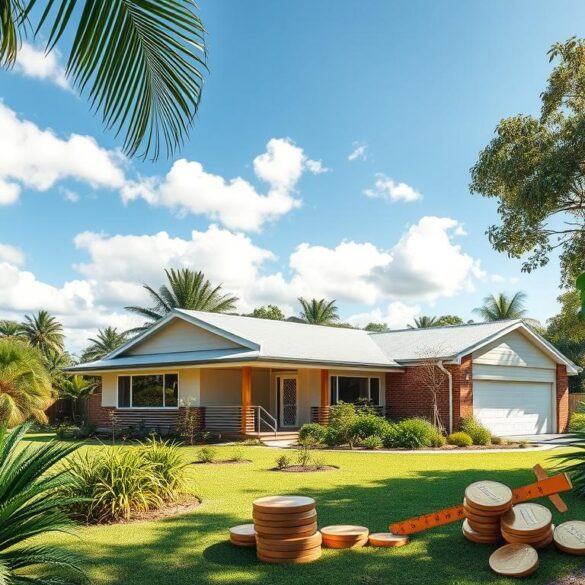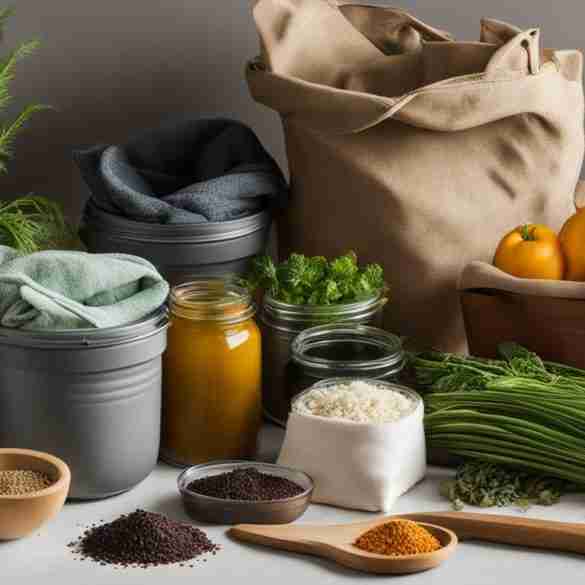Living off-grid in remote areas of Queensland can be tough when it comes to waste management. More people want to live sustainably and lessen their environmental impact. This article will show you how to manage waste off-grid in Queensland. It will help you live responsibly and independently.
Living off-grid in Queensland lets you escape city life and live more sustainably. But, you must manage your waste well to protect the environment. There are many ways to handle off-grid waste, like composting and using greywater systems.
We’ll cover all you need to know about off-grid waste management. You’ll get tips, tech info, and examples from remote areas of Queensland. This guide is for those living off-grid or thinking about it. It will give you the skills and tools for sustainable waste management at home.
Key Takeaways
- Understand the unique challenges of off-grid waste management in remote areas of Queensland
- Discover the benefits of composting and learn effective composting techniques for off-grid homes
- Explore suitable septic systems for wastewater treatment in remote locations
- Learn about greywater systems and how they contribute to sustainable living
- Gain insights into Queensland regulations and guidelines for off-grid waste management
- Uncover recycling and waste reduction strategies tailored to remote homes
- Discover innovative waste management technologies, such as waterless toilets and advanced greywater treatment solutions
Understanding Off-Grid Waste Management Challenges
Living off-grid in Queensland brings special challenges for waste management. Without city waste services, homeowners must find new ways to dispose of waste. This helps reduce their impact on the environment. By learning about these challenges, you can make your off-grid home more sustainable.
Limited Access to Municipal Waste Services
Off-grid folks in Queensland face big challenges without city waste services. Remote places often don’t have regular waste pickup or recycling. This can lead to waste building up, harming the environment and drawing pests.
| Waste Stream | 2025 Target | 2030 Target | 2050 Target |
|---|---|---|---|
| Municipal Solid Waste | 20% reduction | 30% reduction | 60% recycling rate |
| Commercial and Industrial Waste | 15% reduction | 25% reduction | 80% recycling rate |
| Construction and Demolition Waste | 25% reduction | 40% reduction | 85% recycling rate |
Queensland aims to cut waste and boost recycling by 2050, as shown in the table. But off-grid areas need new solutions and a proactive approach to meet these goals.
Environmental Impact Concerns
Bad waste management in off-grid homes can hurt the environment. It can pollute soil, water, and nature, harming animals and plants. Also, waste in landfills makes greenhouse gases, which worsens climate change.
A 2023 study in “Cleaner Waste Systems” journal found up to 15% of waste in Queensland might not be recyclable by 2050. This could lead to more energy-from-waste activities (DOI: 10.1016/j.clwas.2023.100078).
To lessen environmental harm, off-grid folks should focus on reducing, reusing, and recycling waste. Using sustainable practices and new disposal methods can cut down your environmental impact. This helps make Queensland cleaner and healthier.
Composting: A Natural Waste Reduction Solution
For off-grid homes in Queensland, composting is a great way to cut down on waste. It also makes soil rich for your garden. This eco-friendly practice helps lessen your environmental impact and supports a sustainable life.

Benefits of Composting for Off-Grid Homes
Composting has many perks for off-grid homes, like:
- It cuts down on waste sent to landfills
- It makes soil rich for your garden
- It lowers greenhouse gas emissions from waste
- It saves money on fertilizers and soil amendments
In Brisbane, about 26% of household bins are filled with garden waste. Composting this waste can greatly reduce your trash and help the planet.
Composting Methods and Techniques
There are many ways to compost for off-grid homes, such as:
- Traditional composting bins
- Worm farms (vermicomposting)
- Bokashi systems
- Tumbler composters
Each method has its own pros and cons. You can pick the best one based on your space, time, and waste amount.
| Composting Method | Advantages | Considerations |
|---|---|---|
| Traditional composting bins | Low cost, easy to set up | Needs regular turning and upkeep |
| Worm farms | Makes nutrient-rich worm castings, low upkeep | Needs special conditions for worms |
| Bokashi systems | Ferments waste fast, works indoors | Needs bokashi bran and extra composting step |
| Tumbler composters | Easy to turn and aerate, quick composting | Costs more at first |
Utilizing Compost in Your Garden
When your compost is ready, use it to make your garden soil healthy. This helps plants grow well and cuts down on synthetic fertilizers. You can add compost as a top dressing, mix it into the soil, or use it in potting mixes.
Composting is great for your garden and helps with waste reduction and sustainable living. Taking care of your organic waste makes a big difference for the environment. It encourages others to live more eco-friendly too.
More people in Brisbane composting means we can all send less waste to landfills. This leads to a greener future for our communities.
Septic Systems for Off-Grid Wastewater Treatment
Living off-grid in remote areas of Queensland means managing wastewater is tough. Septic systems are a reliable way to treat wastewater. They break down and filter waste, making the water safe for the environment.
Types of Septic Systems Suitable for Remote Areas
For off-grid living in Queensland, there are several septic systems that work well:
- Conventional Septic Systems: These have a septic tank and a drain field. The tank separates solid and liquid waste. The drain field filters the liquid waste before it goes into the soil.
- Aerobic Treatment Units (ATUs): ATUs use oxygen to break down waste faster than traditional systems. They need electricity but produce high-quality treated water.
- Composting Toilets: These systems don’t use water and turn human waste into compost naturally. They’re good for the environment and need little upkeep but might not handle all household wastewater.
When picking a septic system, think about your household size, soil type, and local rules. Talk to a pro to find the best fit for you.
Maintaining and Troubleshooting Your Septic System
Keeping your septic system in good shape is key. Here are some important tips:
- Pump your septic tank every 3-5 years, based on your household size and tank size.
- Avoid flushing things like wipes, cigarette butts, and harsh chemicals. They can mess up the system.
- Use water wisely to not overload the system. Fix any leaks quickly.
- If you smell bad odors, have slow drains, or see soggy areas in the drain field, get a pro to check it out fast.
Investing in a good septic system and maintaining it right helps manage wastewater off-grid in Queensland. Choose sustainable solutions to lessen your environmental impact and enjoy living in remote areas.
| Septic System | Approval Date | Approving Authority |
|---|---|---|
| BioSeptic Performa 2000 | 07/2021 | Queensland Government |
| BioSeptic S-TEN | 12/2023 | Queensland Government |
| Envirocycle Model Mark 6 | 1987 | Department of Primary Industries |
| Advanced Enviro-Septic (AES) | 15/2019 | Chankar Environmental Pty Ltd |
| Advanced Enviro-Septic (AES 38) amendment 1 | 01/2020 | Chankar Environmental Pty Ltd |
| Everhard Industries Aqua-Nova models 80100, 80110, and 80114 | 15/2020 | Queensland Government |
| Houston Services Pty Ltd WWR-Mark IV | 14/2021 | Queensland Government |
| Oxyfix C-90 – Chlorine Model | 09/2019 | Eloy Water Australia |
| Graf Klaro Epro15 | 09/2021 | Queensland Government |
| Rivatec ES10PC | 17/2020 | Queensland Government |
Ecosafe offers a 15-year guarantee on their eco-friendly wastewater system, which is expected to last over 12 years with minimal ongoing costs. Their system can handle up to 8-10 days of waste without power, compared to others that can only manage 2-3 days. Additionally, the Ecosafe system does not require a noisy air-blower, saving on costs as air blowers typically need repair or replacement every 2.5 to 3 years at costs above $1,500.00. Despite potential higher initial installation costs, Ecosafe highlights that their system proves to be the most reliable and cost-effective over time when considering servicing, de-sludging, electricity, and replacement air-blowers.
Greywater Systems: Recycling Water for Sustainable Living
Greywater systems are a key part of sustainable living and water saving for off-grid homes in Queensland. They use wastewater from sinks, showers, and baths but not toilets. This helps cut down on water use and lessens harm to the environment.
There are different types of greywater systems. Some are simple and cheap, like using buckets or hoses. Others use filters to keep the water clean for gardens.
When setting up a greywater system, think about the water quality. Kitchen water is often dirty because of detergents and food waste. This can harm plants and soil. Also, greywater can be too alkaline, which affects soil and plants.
Using greywater systems helps us live sustainably and manage water better. It saves money and protects our water resources.
Here are tips to make your greywater system work well:
- Choose eco-friendly cleaners to protect soil and plants
- Keep filters clean to avoid blockages
- Know the rules for greywater systems in Queensland
- Watch how your plants and soil react to the greywater
The Greywater Tiny Homes Bundle is a great option for tiny homes and rentals. It costs $2,200.00 AUD and includes everything you need to start recycling water. This system helps save money and is good for the planet.
| Component | Function |
|---|---|
| 80-litre Grease Trap | Keeps kitchen wastewater clean by removing fats and oils |
| GREYFLOW Greywater Diverter | Sends greywater from sinks and showers to be reused |
| Complete Drip Tube Kit | Sprinkles recycled greywater on plants |
By using greywater systems and recycling water wisely, we can all help save water. Whether you start small or go for a full system like the Greywater Tiny Homes Bundle, every step helps. It’s all about living more sustainably and saving our water resources.
Off Grid Residential Waste Management in Queensland
Managing waste well is key to living off-grid in Queensland. As an off-grid homeowner, knowing the state’s rules is vital. This ensures your waste handling is right and good for the planet. By using tested methods and learning from others, you can make a waste system that’s good for the earth and your off-grid life.
Queensland Regulations and Guidelines for Off-Grid Waste Management
Queensland has rules for off-grid waste handling. These rules cover things like:
- Wastewater treatment and disposal
- Greywater reuse
- Composting toilet systems
- Solid waste management
Following these rules helps avoid fines and keeps your home and the environment safe. Important tips include:
- Get permits for wastewater systems
- Keep waste systems in good shape
- Keep records of how you handle waste
- Dispose of hazardous waste right
Case Studies of Successful Off-Grid Waste Management in Queensland
Many off-grid places and homes in Queensland do waste well. The Currumbin Ecovillage is a great example. It shows how treating wastewater and using recycled water works in homes.
The Currumbin Ecovillage treats 80,000 liters of wastewater daily. The treated water is used for plants and toilets. This cuts down on the need for city water and lowers environmental harm.
Other good examples in Queensland are:
| Case Study | Waste Management Practices | Outcomes |
|---|---|---|
| Off-grid homestead in Daintree Rainforest | Composting toilets, greywater system, solar power | 90% less water use, very little waste |
| Eco-retreat in Noosa Hinterland | Worm farm composting, recycling, solar power | No waste to landfill, all energy from the sun |
| Sustainable farm in Sunshine Coast | Biogas digester, composting, rainwater harvesting | Energy independent, makes fertilizer from waste |
Looking at these successful examples and applying their ideas to your place can help you make a great waste system. This will follow Queensland’s rules and help the environment.
Recycling and Waste Reduction Strategies for Remote Homes
Living off-grid in Queensland doesn’t mean you have to give up on being green. You can use recycling and waste reduction to lessen your impact on the planet. The Waste Management and Resource Recovery Strategy in Queensland aims to boost recycling. This makes it easier for off-grid homes to be eco-friendly.

Implementing a Household Recycling Program
Starting a recycling program is a great way to cut down on waste at home. Set up bins for recyclables like paper, plastic, glass, and metal. Teach your family why recycling is important and get them to help out. Work with local recycling places to make sure your recyclables get turned into something new.
In 2016–17, Australia made 67 million tonnes of waste, or about 2.7 tonnes per person. The goal is to get an 80% recovery rate from all waste by 2030. A recycling program at home helps meet these goals and cuts down on landfill waste.
Reducing Waste Through Mindful Consumption
Being mindful of what you buy is key to less waste. Choose items with less packaging and go for reusable over disposable. Use products made from recycled stuff and bring your own bags and containers when shopping.
The National Waste Policy wants to cut organic waste in half by 2030. Composting food and garden waste helps meet this goal. It also makes good soil for your garden.
Repurposing and Upcycling Materials
Think twice before throwing anything away. Old things like furniture and containers can be given new life. This saves money and reduces waste. Upcycling turns waste into something valuable for your home.
| Material | Repurposing Ideas |
|---|---|
| Glass Jars | Use as storage containers, planters, or candle holders |
| Wooden Pallets | Transform into furniture, vertical gardens, or compost bins |
| Fabric Scraps | Create quilts, cushion covers, or reusable shopping bags |
| Plastic Bottles | Repurpose as bird feeders, self-watering planters, or organizers |
These strategies can greatly reduce your impact on the environment while living off-grid in Queensland. As Sustainable Home Magazine says, going green is good for the planet and for you. It makes living off-grid more rewarding.
“The greatest threat to our planet is the belief that someone else will save it.” – Robert Swan, Author and Environmentalist
Harnessing Renewable Energy for Waste Management
If you live off-grid in Queensland, you can use renewable energy to manage waste better. Solar power and biogas digesters can help you. They cut down on your environmental impact and make you more self-sufficient.
Solar-Powered Waste Management Solutions
Queensland has a lot of solar energy. Using it, you can handle your waste well and use less fossil fuel. Here are some solar-powered ways to manage waste:
- Solar-powered compactors make waste smaller, so it’s easier to store and move
- Solar-powered recycling systems sort and process recyclable stuff
- Solar-powered systems treat organic and non-organic waste
These solar solutions cut down your energy use and emissions from waste management a lot.
Biogas Digesters for Energy Production and Waste Reduction
Biogas digesters are great for off-grid waste management. They turn food scraps and animal manure into biogas. This biogas is good for cooking, heating, and making electricity. The process also makes the waste smaller and creates energy.
Using biogas digesters helps in many ways:
- It makes waste smaller by breaking down organic stuff into biogas
- It makes a renewable energy source for different uses
- It cuts down on greenhouse gases by using methane instead of letting it out
- It makes a special kind of fertilizer for your garden or crops
| Renewable Energy Source | Waste Management Benefits | Energy Production Potential |
|---|---|---|
| Solar Power | Reduces energy use and cuts down on greenhouse gases from waste management | Can power waste compactors, recycling systems, and treatment systems |
| Biogas Digesters | Reduces waste and greenhouse gases while making nutrient-rich digestate | Can make biogas for cooking, heating, and electricity |
Using solar power and biogas digesters in your waste management makes you more sustainable and self-sufficient. It also lowers your environmental impact.
Choosing renewable energy for waste management helps the environment. It also lets off-grid homeowners control their waste and energy better.
Community-Driven Waste Management Initiatives
In Queensland, community efforts are key in managing waste sustainably, especially in rural areas. These efforts focus on taking care of the environment. They also encourage people to work together to reduce waste and save resources for a better future.
The City of Moreton Bay is investing $3 million to upgrade the Woodford Waste Transfer Facility. This project is getting some funding from the Queensland Government. It aims to improve waste tracking, follow the law, and make sure waste is disposed of properly. The upgrade includes a new weighbridge, gatehouse, CCTV, and solar power system.

- Community composting programs that help people compost their organic waste. This reduces landfill waste and makes soil good for gardens.
- Recycling drives by community groups and schools. They teach people why recycling is important and where to recycle right.
- Workshops on reducing waste and living eco-friendly. These teach people how to live sustainably every day.
Rural communities in Queensland are playing a big part in managing waste. The state wants to cut landfill waste by 80% by 2030. It’s aiming to lead in recycling and making new products from waste. The state has a $100 million program to help the recycling industry grow and create jobs.
| Initiative | Impact |
|---|---|
| Community composting programs | Reduces organic waste in landfills and creates nutrient-rich soil for local gardens |
| Recycling drives | Raises awareness about recycling and provides opportunities for responsible disposal of recyclable materials |
| Educational workshops | Empowers community members with knowledge and skills to adopt sustainable practices in daily life |
Queensland is focusing on sustainable waste management. Community efforts are key in engaging rural areas and protecting the environment. By working together, we can make a cleaner, greener future for all.
Overcoming Challenges and Embracing Sustainable Waste Management
Living off-grid in Queensland brings special challenges with waste management. But, by using sustainable ways and working with local authorities, you can handle your waste well. This also helps lessen your impact on the environment.
To beat the off-grid waste management hurdles, you need education, awareness, and teamwork. Learning about sustainable waste management helps you make good plans for your remote home.
Education and Awareness Programs
It’s key for off-grid homeowners to join education and awareness programs. These programs teach you about:
- Composting techniques
- Recycling best practices
- Waste reduction strategies
- Proper waste disposal methods
By going to workshops, seminars, or online courses, you can learn what you need to know. This helps you put good waste management plans into action at your off-grid home.
Collaborating with Local Authorities and Organizations
Working with local authorities and groups is vital for following rules and getting help with sustainable waste management. Think about these steps:
- Talk to your local council for advice on waste management rules for off-grid living in Queensland.
- Work with environmental groups that focus on sustainable waste management for remote places.
- Join community efforts that push for less waste, more recycling, and composting.
By teaming up with local groups and people who care about the same things, you can build a network. This network helps you tackle the waste management challenges of off-grid living.
| Collaborative Effort | Benefits |
|---|---|
| Partnering with local councils | Access to resources, guidance on regulations, and potential waste management services |
| Joining environmental organizations | Expertise in sustainable waste management, innovative solutions, and community support |
| Participating in community initiatives | Shared resources, knowledge exchange, and collective action towards sustainable living |
By focusing on education, awareness, and teamwork, you can adopt sustainable waste management in your off-grid Queensland home. Remember, even small changes in your daily life can make a big difference for your home and the planet.
Innovative Waste Management Technologies for Off-Grid Living
Living off-grid in Queensland has its own set of waste management challenges. But, new technologies are making it easier to go green. These include waterless toilets, composting systems, and advanced greywater treatment. They’re changing how remote homes deal with waste.
Waterless Toilets and Composting Systems
Waterless toilets and composting systems are big wins for off-grid homes. They use less water and turn waste into garden food. The Clivus Multrum and Sun-Mar are popular among eco-friendly homeowners. They offer a green choice over traditional toilets.
Biogas digesters are another great way to handle waste. They make biogas for cooking and electricity, and they make fertilizer too. A project in Moreton Bay, Queensland, shows how renewable energy can come from waste.
| Technology | Benefits |
|---|---|
| Waterless Toilets | Reduces water consumption, produces compost |
| Composting Systems | Converts human waste into nutrient-rich compost |
| Biogas Digesters | Produces biogas and organic liquid fertilizer, low maintenance |
Advanced Greywater Treatment Solutions
Greywater can be treated and reused with advanced systems. Constructed wetlands and biofiltration systems are great for this. They make greywater safe for irrigation or toilet use. This helps off-grid homes use less water and live sustainably.
Over 30,000 megawatt hours of electricity were generated by ENOPTE’s energy management technologies since 2014, saving over 24,000 tonnes of carbon emissions.
The clean tech sector is growing fast in Queensland. It’s worth $228 million and has over 150 businesses and 1500 jobs in the Sunshine Coast area. These technologies are good for the planet and can save money. Off-grid homes can help the environment and enjoy the perks of living remotely.
Conclusion
In Queensland, managing waste off-grid is key to living green in remote spots. By using new ideas and following laws like the Waste Reduction and Recycling Act 2011, off-grid folks can lessen their harm to the planet. The Queensland Waste Avoidance and Resource Productivity Strategy (2014–2024) helps boost recycling and cut down on trash.
Using composting, septic systems, and recycling greywater are big steps towards green waste management. These actions cut down on trash and help remote living be more self-sufficient. Groups and learning programs are important for spreading the word and getting more people to go green.
As more people choose off-grid living in Queensland, it’s key to keep up with new tech and rules on waste management. Working with local groups and experts helps build a greener community. Going green with waste management is good for the planet and makes living in remote places healthier and stronger.
FAQ
What are the main challenges of off-grid waste management in Queensland?
Off-grid homes in Queensland have a hard time with waste. They don’t get help from city waste services. They also worry about harming the environment if they don’t dispose of waste right. They need to find new ways to deal with waste to lessen their environmental impact.
How can composting help reduce waste in off-grid homes?
Composting is a great way for off-grid homes in Queensland to cut down on waste. It turns waste into nutrient-rich soil for gardens. There are many ways to compost, like bins, worm farms, and bokashi systems, that help with sustainable living.
What types of septic systems are suitable for off-grid wastewater treatment in Queensland?
For remote areas in Queensland, there are many septic systems that work well. These include regular septic tanks, aerobic units, and composting toilets. Keeping these systems clean and checked regularly is key to their success.
How can greywater systems help conserve water in off-grid homes?
Greywater systems let off-grid homes in Queensland use water again for things like watering plants and flushing toilets. This saves a lot of water and helps septic systems last longer. But, it’s important to make sure the greywater is clean before using it again.
What regulations and guidelines should off-grid homeowners in Queensland be aware of regarding waste management?
Off-grid homes in Queensland must follow rules and guidelines to protect the environment and health. It’s important for homeowners to know these rules and follow them. This helps avoid legal problems and keeps the environment safe.
How can off-grid homeowners in Queensland implement a household recycling program?
To start a recycling program, separate recyclables like paper, plastic, glass, and metal from trash. Also, think about your purchases and try to buy things with less packaging. Avoid things you use once and throw away to make less waste.
What role can renewable energy sources play in sustainable waste management for off-grid homes?
Using renewable energy, like solar power, helps off-grid homes manage waste better. Solar-powered waste systems, like compactors or recycling machines, use less energy and cut down on harmful gases.
How can community-driven initiatives promote sustainable waste management in off-grid and rural communities in Queensland?
Projects led by the community, like composting together, recycling events, and workshops on reducing waste, work well. They teach people to care for the environment and work together. This leads to less waste, saved resources, and a better future for off-grid living.
What innovative waste management technologies are emerging for off-grid living in Queensland?
New tech like waterless toilets, composting, and advanced greywater systems is coming to off-grid living in Queensland. These can cut down on water use, turn waste into soil, and make greywater safe for watering plants or flushing toilets.

